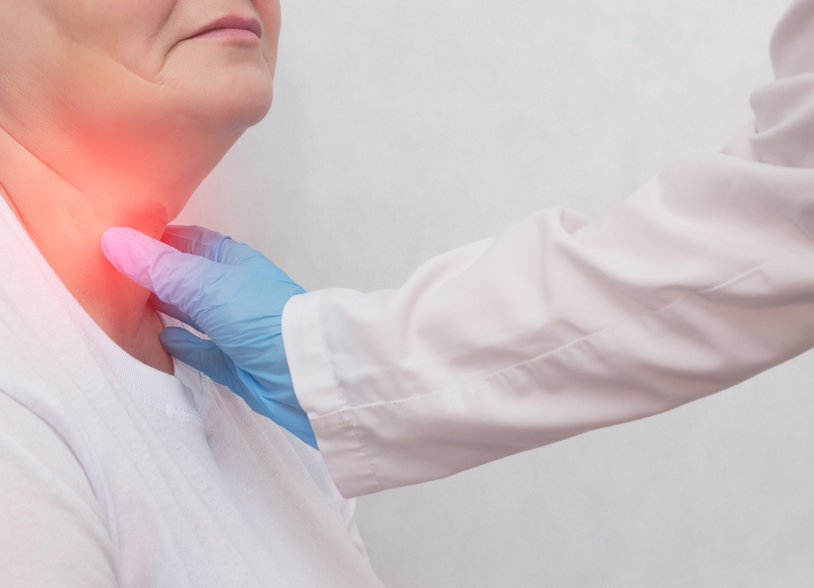Hypothyroidism, or an underactive thyroid, occurs when your thyroid doesn’t produce enough thyroid hormones to help your body regulate and use energy. It is estimated that nearly 5 out of 100 Americans over the age of 12 have an underactive thyroid. Women are more likely than men to have an underactive thyroid, and this condition becomes more common as you age.
Symptoms of hypothyroidism can vary from person to person, and some people may experience mild to no symptoms. Some common symptoms of an underactive thyroid include:
- Fatigue
- Weight gain
- Cold intolerance
- Dry skin
- Thinning hair
- Heavy or irregular menstrual periods
- Slowed heart rate
- depression
Read more about hypothyroidism here.
Hypothyroidism is a lifelong condition; if it goes untreated, it can cause complications like nerve injury, kidney damage, sleep apnea, and infertility problems. Rarely, untreated severe hypothyroidism can cause myxedema coma, which is when your body’s functions slow down to a life-threatening point. If you are diagnosed with hypothyroidism, it is important to listen to your medical doctor and take your medication as prescribed to prevent these more serious complications.
Levothyroxine:
The best treatment for hypothyroidism is levothyroxine; brand names include Synthroid and Levoxyl. Levothyroxine is a synthetic version of T4, or thyroxine, which is one of the thyroid hormones your body would normally produce. This medicine copies the action of T4 and helps your body get back to normal levels of thyroid hormone in your blood. When your hormone levels return to normal, symptoms should become more manageable or disappear.
Your medical doctor will monitor your thyroid levels through regular blood tests, and you may require dose adjustments throughout your lifetime. When taken as directed at the right dose, levothyroxine is very safe and should not cause any side effects.
Absorption of levothyroxine can be affected by food and other medications; it is best to take this medicine on an empty stomach at the same time every day.
Liothyronine:
Liothyronine is a synthetic version of T3, or triiodothyronine, which is another hormone that your thyroid produces. Brand names of liothyronine include Cytomel and Triostat.
T4 is converted to T3 in the body, so there is no real advantage to taking synthetic T3 in most cases. It is also absorbed very rapidly by your body and has a greater potential for causing side effects.
Natural thyroid:
Natural thyroid formulations are an alternative treatment for hypothyroidism made from the thyroid glands of pigs; brand names include Armour Thyroid and Nature-throid. Natural thyroid contains both T4 (found in levothyroxine) and T3 (found in liothyronine).
Studies haven’t shown natural thyroid formulations to work any better than levothyroxine. It has also been found that the amount of hormones found in these animal extract medications can vary. For these reasons, most medical providers do not recommend the use of this medication over levothyroxine.
Natural supplements:
Many health food stores offer supplements that contain thyroid gland extracts from animal sources. These supplements are not monitored or regulated by the Food and Drug Administration (FDA), which means their ingredients and effectiveness are not guaranteed. These products should not be used without consulting with your medical doctor first.
Paying for your medications:
Levothyroxine, liothyronine, and natural thyroid are available in many generic formulations and should be covered by most Medicare and commercial insurance plans. The brand name formulations may not be covered or may come with a higher copay. If you are having trouble paying for medications, Easy Drug Card may be able to provide medication discounts at one of the 65,000+ participating nationwide and local neighborhood pharmacies.
References:
1. U.S. Department of Health and Human Services. (n.d.). Hypothyroidism (underactive thyroid). National Institute of Diabetes and Digestive and Kidney Diseases. Retrieved January 20, 2022, from https://www.niddk.nih.gov/health-information/
endocrine-diseases/hypothyroidism
2. Marion, DW. Levothyroxine. In: UpToDate, Post, TW (Ed), UpToDate, Waltham, MA, 2022.
3. Marion, DW. Liothyronine. In: UpToDate, Post, TW (Ed), UpToDate, Waltham, MA, 2022.
4. Marion, DW. Armour Thyroid. In: UpToDate, Post, TW (Ed), UpToDate, Waltham, MA, 2022.











